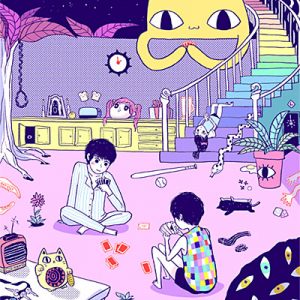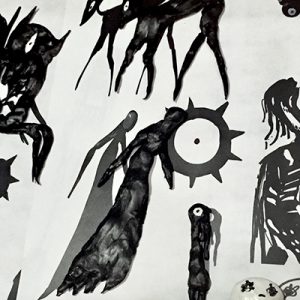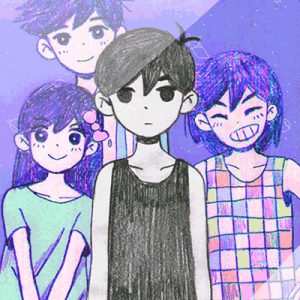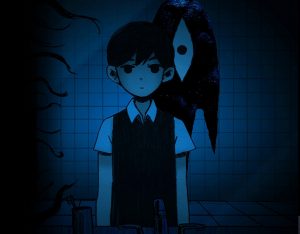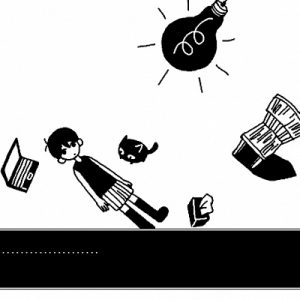This article originally featured in the March 2021 issue of Connect.
Recommended Video Game: OMORI
Sarah Baughn (Ishikawa)
“The truth is . . .
Your story is already over. You just
have to remember it.”
OMORI is a psychological horror RPG game told expertly through its unique and striking visuals and outstanding music. It is currently available on Steam, with an expected release on Nintendo Switch. OMORI was first announced in 2013 and released on December 25, 2020 after many long delays, and I’m happy to say OMORI is well worth the wait.
Omori lives alone in a blank room unless he decides he’d rather spend time with his colorful neighbors, who are always excited to see him. When one of their friends goes missing, the group takes a break from their constant games and picnics to make it their mission to go find him. All the while, Omori is haunted by “Something” that keeps appearing, poking holes through the sugary exterior to remind you that it’s a psychological horror game.
Focused on the power of dreams and imagination, OMORI creates some fascinating and whimsical environments that are fun to explore. Omori and his friends travel through many environments, including a magical desert made of brown sugar in a land full of dinosaurs, baked goods, and a ‘food pyramid’ you excavate with a spoon—which is a fair example of how bizarrely charming the entire experience can be.
While the adorable art style has a good chance of lulling you into forgetting that OMORI is a psychological horror game, when the “Some-thing” monsters do make their presence known, the art style shifts dramatically and the horror sets in. The game has some pretty serious warnings at the beginning that people should pay attention to. OMORI is intimately tied with depictions of mental illness, loss, and trauma, with the monsters being more symbolic depictions of personal fears that did genuinely freak me out at times.
Made in RPG Maker, OMORI is primarily a classic turn-based RPG that sometimes requires you to solve puzzles to continue. The combat system is simple but has a neat “emotion” mechanic that allows you to make your party members Angry, Happy, or Sad which gives them benefits and detriments in combat. Being Happy, for example, ups the critical hit rate of a character while also lowering their overall hit rate. The group also has Follow-up Attacks that have to be timed correctly, with the party members working together to cheer each other on to become Happy or annoying other party members
into becoming Angry. With the focus on emotions and relationships, it’s a very charming, if simple, system that ties well into the game’s themes.
There are puzzles to solve, a ton of side quests to do, and large areas of entirely optional content which helps flesh out the quirkiness of the world Omori lives in. As with many cult-classic RPG maker games, though, the focus isn’t on the game mechanics, but rather on the story, art, and atmosphere. OMORI’s soundtrack is also worth mentioning, coming in at 179 different tracks that really elevate the more emotional moments and make the boss fights feel infinitely more hype.
Though not for everyone, if you have any interest in RPG games, psychological horror, or an incredibly tragic story that I’m still trying to wrap my head around weeks later, I cannot recommend OMORI enough.
Sarah lives in Ishikawa and spends her time playing koto, studying Japanese, and traveling. Except when traveling got cancelled and Sarah found herself living vicariously through video games again.


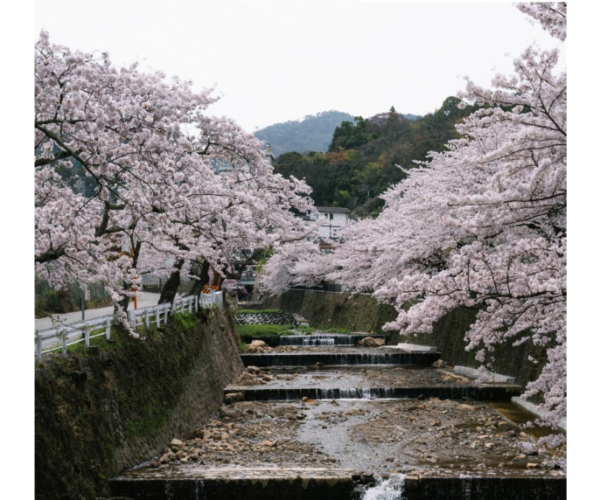
![CONNECT ART ISSUE 2024 SUBMISSIONS [CLOSED]](https://connect.ajet.net/wp-content/uploads/2024/04/ARTISSUE-INSTA-600x500.png)
